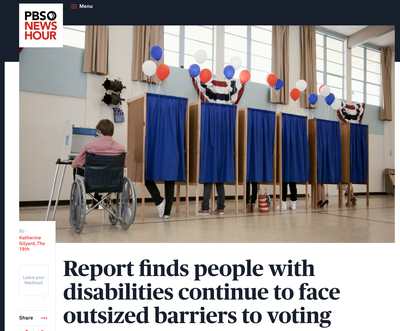For a Google doc version of this lesson, click here. You will be prompted to make your own copy to access the lesson.
OVERVIEW
In the U.S., people with developmental and intellectual disabilities often wait years for the services they need. Many of these people require help with daily activities required to survive such as cooking and performing a job. In Oklahoma, the average wait time for these services is 5.5 years.
President Franklin D. Roosevelt’s Fair Labor Standards Act made it legal to pay workers with disabilities less than the federal minimum (14(c) program). Because of this, many workers with disabilities earn a small percentage of the pay that workers without disabilities earn.
The story is part of NewsHour's series, Disability Reframed, with Judy Woodruff. More lessons from the series can be found here.
Essential questions
- How can people with disabilities receive the day-to-day care they require in order to survive?
- How can the U.S. make sure that people with disabilities are paid minimum wage?
Estimated time: Two class periods (45-50 min each)
Grades: 6-12
WARM UP ACTIVITY: Day 1
Watch “Oklahomans with disabilities face long waitlists for home and community-based services” from PBS Newshour’s “Disability Reframed” series, stopping at specific times to discuss, reflect and write.
- Work in groups of 3-4.
- Stop the video at 3:32. Discuss and then respond in writing to the following questions:
- What do you notice, wonder, and think?
- Look up some information about Autism Spectrum Disorder, one of the disabilities that Judy Woodruff mentions Milena has been diagnosed with. What questions do you have?
- Do you think Milena and her mother Maria should receive the help they need? Why or why not?
- Stop the video at 8:01. Discuss and then respond in writing to the following questions:
- Is $12.50 an hour a living wage? Can a caregiver live on this salary in 2024?
- Medicaid is a joint federal and state program that provides health coverage to some people who could not otherwise afford it. Why might Medicaid be underfunded?
- Do you think William and his mother, State Representative Ellyn Hefner, should receive the help they need? Why or why not?
- Finish watching the video. Discuss and then respond in writing to the following question:
- Identify at least three issues that need to be fixed so that people with disabilities can get the help they need.
MAIN ACTIVITY: Day 2
Watch "Advocates concerned about workers with disabilities making below minimum wage."
- Write on the board a quote from Felix Adler, American educator and founder of the Ethical Culture movement who said: “To care for anyone else enough to make their problems one’s own, is ever the beginning of one’s real ethical development.”
Students work in their groups to answer the following questions:
- What do you think this quote means?
- Give two examples of someone caring for another in this way.
- Does this way of thinking resonate with you? Why or why not?
- Do you think that people with disabilities have the right to be paid minimum wage? Why or why not?
- As a class, discuss and share-out responses.
- Then, as a class, share-out the responses to the questions from the PBS Newshour video from Day 1.
- On the board, write all the issues students identified on Day 1 (question 5.A) that need to be fixed so that people with disabilities can get the help they need.
- Students work in their groups to brainstorm and write ideas to fix each of the issues identified on the board.
- Again, as a class, share-out responses.
EXTENSION ACTIVITY
- Use New York State’s Office for People With Developmental Disabilities and Self Advocates Becoming Empowered to research advocacy groups for people with disabilities.
- Read PBS Newshour’s “Report finds people with disabilities continue to face outsized barriers to voting.” Identify the problems and come up with some of your own solutions.

STANDARDS
CCSS.ELA-LITERACY.RH.6-8.2; 9-10.2; 11-12.2
College, Career, and Civic Readiness
D2.Civ.2.6-8 Explain specific roles played by citizens (such as voters, jurors, taxpayers, members of the armed forces, petitioners, protesters and office-holders).
About the lesson author
Dina Weinberg has worked with children and teens in public and private schools for the past 25 years. She taught middle school English, worked as a teaching artist on large scale collaborative mural projects, created and led a Seed to Table Garden program and taught fine art to children for the last 20 years. Her approach to teaching and learning stems from her belief that every person has the right to grow in a fulfilling, enjoyable, and safe way. Dina currently works one-on-one with students on expository, personal, and historical writing skills; math and science, and building organizational skills. She is the mother of two grown daughters and lives in Bronx, New York, with her husband.
Please fill out this form to share your thoughts on Classroom’s resources.






